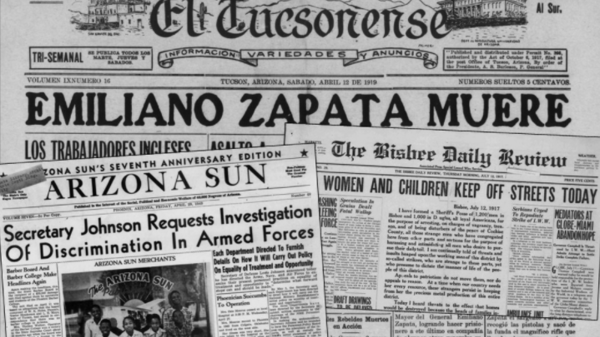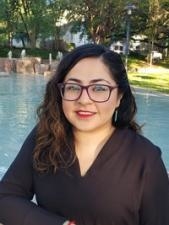
Newspapers as Data Symposium (Virtual)

We invite you to learn about the partnerships between the library and disciplinary scholars, hear about the implementation of computational analysis in multidisciplinary undergraduate and graduate courses in the social sciences and humanities, and preview a showcase of student work.
See the program schedule and register.
This symposium represents the culmination of a Collections as Data: Part to Whole grant awarded to the University of Arizona Libraries funded by The Andrew W. Mellon Foundation in partnership with the University of Nevada Las Vegas.
"Using Newspapers as Data for Collaborative Pedagogy: A Multidisciplinary Interrogation of the Borderlands in Undergraduate Classrooms" brought together a group of disciplinary scholars, library faculty, and staff to introduce students to data literacy and computational analysis using digitized historical newspapers from Arizona.
About the keynote speaker
To close the symposium, we welcome keynote speaker, Sylvia Fernández Quintanilla, who will present, “De aquí y de allá: Development of Transborder Data and Archives through Borderlands Digital Humanities Pedagogy, and Praxis.”
Abstract
Safiya Noble (2018) notes that the invention of print culture accelerated the need for information classification schemes. In regards to the classification of archival sources, such as newspapers from the Mexico-United States border, the cataloguing process has emphasized a division by classifying these documents as part of one country or the other, either Mexico or the U.S. Nevertheless, it is important to consider that border regions are fluid and have always been in contact, both through their ecosystem as well as through their connected cultural relations and exchanges. Mobility is embedded in the print culture of borderland newspaper production, as well as in its distribution and content, which includes a variety of data that documents transborder (transfronteriza/o) identities and dynamics.
Drawing on the understanding that information architecture and cataloguing have always been sociopolitical and historical processes enacted for particular interests, and given the fact that, at this moment in history, data and technology are being invested to control, surveil, dehumanize, and divide border communities more than ever, how can we develop digital humanities pedagogy and praxis through the use and creation of archives and data that radically shift our ability to (re)contextualize the history, culture and dynamics of border communities?
Stemming from my identity as a transfronteriza and from my scholarship at the intersections of border studies, archives-literature, and digital technologies, this talk will focus on the use of digital tools with archival sources to develop digital scholarship that challenges hierarchical schemes to intervene in the dominant canons of knowledge at both the individual and community level. Through this discussion, Fernandez will introduce digital humanities interventions, such as Borderlands Archives Cartography (BAC) that have contextualized the complexity and multiplicity of the U.S.-Mexico borderlands and its print, digital and cultural record.
Biography

Dr. Fernández is the Public and Digital Humanities Postdoctoral Researcher in the Hall Center for the Humanities, Institute of Digital Research in the Humanities (IDRH) and The Commons at the University of Kansas.
She collaborates with faculty, students and library professionals leveraging digital technologies in humanities research, pedagogy and knowledge production. Fernández earned a Ph.D. in Hispanic Studies (Literature) with certifications in Women’s, Gender and Sexualities Studies and Spanish as a Heritage Language from the University of Houston.
Her research, teaching and community work is situated at the intersections of Latinx-Mexican Border Literature, Archives, Languages and Cultures, Intersectional and Transnational Feminisms, Immigration and Border Studies, and Digital Humanities. She is among the creators and principal coordinator of warmly received public and digital bilingual initiatives: Borderlands Archives Cartography, United Fronteras, GeoTestimonios Transfronterizxs, and collaborates as part of the core team of remarkable projects such as Torn Apart/Separados, Huellas Incómodas and others.
Currently, she is working on a hybrid monograph based on her dissertation titled, "Genealogía Transfronteriza (Re)interpretaciones literarias de identidades femeninas en Cd. Juárez-El Paso."
Speakers
Speakers include Celeste González de Bustamante (School of Journalism), Anita Huizar-Hernández (Department of Spanish & Portuguese), Marya McQuirter (Public History Collaborative), Katherine Morrissey (Department of History), and Cristina D. Ramírez (Department of English), and from the University Libraries, Mary Feeney, Erika Castaño, Jeff Oliver, and Megan Senseney.
For questions or requests regarding disability-related accommodations, contact Maggie Verebelyi.